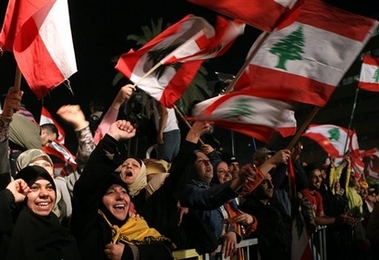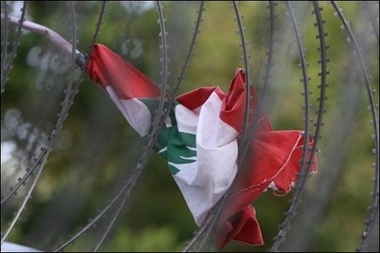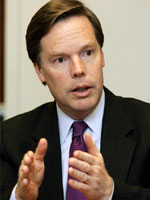 AP, Dec 4, 2006 Nearly two months after the rest of its army left southern Lebanon, Israel agreed yesterday to pull its few dozen remaining soldiers from the Lebanese part of a village divided by the border, yielding control to U.N. peacekeepers. The move came as Israel's Cabinet discussed the three-day-old siege of Lebanese Prime Minister Fouad Siniora's government by pro-Hezbollah demonstrators in Beirut. Commentators here called the troop pullout a diplomatic gesture aimed at shoring up Siniora's position, but some said it would be of little help.
AP, Dec 4, 2006 Nearly two months after the rest of its army left southern Lebanon, Israel agreed yesterday to pull its few dozen remaining soldiers from the Lebanese part of a village divided by the border, yielding control to U.N. peacekeepers. The move came as Israel's Cabinet discussed the three-day-old siege of Lebanese Prime Minister Fouad Siniora's government by pro-Hezbollah demonstrators in Beirut. Commentators here called the troop pullout a diplomatic gesture aimed at shoring up Siniora's position, but some said it would be of little help.
Israeli officials are alarmed by the crisis in Lebanon, fearing that a collapse of the moderate regime could bring to power an Iranian proxy state on Israel's northern border and lead to another war like the inconclusive 34-day conflict last summer with Hezbollah.
BRUSSELS, Belgium: The European Union's foreign policy chief said Monday he backed Lebanon's embattled Prime Minister Fuad Saniora, who faces protests by supporters of the Hezbollah movement seeking to bring down the government.
"Prime Minister Saniora has done a good job," Javier Solana told reporters. "There is a constitutional government, which came from free elections and is behaving in our opinion in a very positive manner."
The standoff between Saniora and the Hezbollah-led opposition turned violent Sunday leaving a Shiite man dead from gunshot wounds and 21 others injured. Soldiers and police, backed by tanks and armored vehicles, surrounded government headquarters in a protective cordon.
 by Henri Mamarbachi, BEIRUT (AFP) - Tensions ran high in Lebanon after a Shiite was killed in a Beirut street fight near a mass rally against the Western-backed government, stoking fears of a descent into sectarian strife.
by Henri Mamarbachi, BEIRUT (AFP) - Tensions ran high in Lebanon after a Shiite was killed in a Beirut street fight near a mass rally against the Western-backed government, stoking fears of a descent into sectarian strife.
The killing in a pro-government neighborhood was the first violent incident since the launch of the open-ended protest on Friday, threatening to take an already heated cauldron of political division to boiling point.Hundreds of army troops were manning armored vehicles on every street corner of the district where the clashes erupted, while at the protest, Hezbollah's civilian-clothed security men were maintaining a tight grip on the crowds."Arab countries cannot stand by and watch a situation that could get worse," said Arab League chief Amr Mussa after meeting President Emile Lahoud.
Hezbollah has spearheaded the protest against a government it accuses of being corrupt, weak and no longer representative of the Lebanese people after six pro-Syrian ministers resigned last month. Prime Minister Fuad Siniora's government has dug in its heels, insisting that only talks, not protest, can solve Lebanon's political crisis. But the opposition has vowed to continue the demonstration until the government falls
Khazen History


Historical Feature:
Churches and Monasteries of the Khazen family

St. Anthony of Padua Church in Ballouneh
Mar Abda Church in Bakaatit Kanaan
Saint Michael Church in Bkaatouta
Saint Therese Church in Qolayaat
Saint Simeon Stylites (مار سمعان العامودي) Church In Ajaltoun
Virgin Mary Church (سيدة المعونات) in Sheilé
Assumption of Mary Church in Ballouneh
1 - The sword of the Maronite Prince
2 - LES KHAZEN CONSULS DE FRANCE
3 - LES MARONITES & LES KHAZEN
4 - LES MAAN & LES KHAZEN
5 - ORIGINE DE LA FAMILLE
Population Movements to Keserwan - The Khazens and The Maans
ما جاء عن الثورة في المقاطعة الكسروانية
ثورة أهالي كسروان على المشايخ الخوازنة وأسبابها
Origins of the "Prince of Maronite" Title
Growing diversity: the Khazin sheiks and the clergy in the first decades of the 18th century
Historical Members:
Barbar Beik El Khazen [English]
Patriach Toubia Kaiss El Khazen(Biography & Life Part1 Part2) (Arabic)
Patriach Youssef Dargham El Khazen (Cont'd)
Cheikh Bishara Jafal El Khazen
Patriarch Youssef Raji El Khazen
The Martyrs Cheikh Philippe & Cheikh Farid El Khazen
Cheikh Nawfal El Khazen (Consul De France)
Cheikh Hossun El Khazen (Consul De France)
Cheikh Abou-Nawfal El Khazen (Consul De France)
Cheikh Francis Abee Nader & his son Yousef
Cheikh Abou-Kanso El Khazen (Consul De France)
Cheikh Abou Nader El Khazen
Cheikh Chafic El Khazen
Cheikh Keserwan El Khazen
Cheikh Serhal El Khazen [English]
Cheikh Rafiq El Khazen [English]
Cheikh Hanna El Khazen
Cheikha Arzi El Khazen
Marie El Khazen
 Washington
Washington